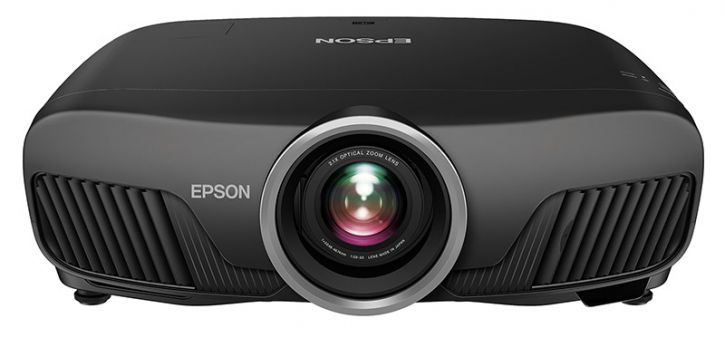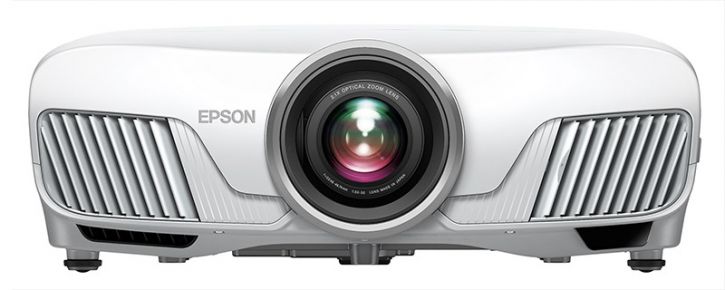Ultra HD 4K TVs can be impressive. But at screen sizes under 70 inches, it can be difficult to spot big differences between 4k and 1080p resolution, from normal viewing distances. But when you blow up that screen to 100 or even 200 inches, that extra detail comes in handy.
And perhaps even more important than the number of pixels is the quality of those pixels. A feature we're seeing on many higher end flat panel Ultra HD TVs called HDR (High Dynamic Range) allows whites to be brighter, blacks darker and all the colors in between to be a bit more vivid. With HDR-enabled content, an HDR-capable display can provide significantly better image quality than one that is not HDR-enabled.
With all that said, 4K resolution and HDR capabilities are something that have not yet made it into the affordable home theater projector market. At least not until now. This week, Epson is unveiling a new line of home theater projectors at the CE Week show in New York City and the specs look pretty impressive, as are the prices (in a good way). The new projectors support sources with 4K Ultra HD resolution and HDR 10 high dynamic range, and pricing starts at $2,699 for the Pro Cinema 4040. The brighter, higher performance Pro Cinema 6040UB is priced at $3,999. In the consumer line, we find the Home Cinema 5040UB for $2999.99 and the Home Cinema 5040UBe for $3299. The Pro Cinema projectors are expected to be available in August through CEDIA and specialty dealers. The Home Cinema models will also be be available in August through select Brick and Mortar and online retailers.

But there are asterisks. The actual LCD imaging module that these projectors use does not offer native 4K/Ultra HD resolution; they use a 3-chip 1080p LCD panel (1920x1080 resolution). These new Epson projectors accept an incoming 4K image at 3840×2160 resolution and shift the pixel position diagonally extremely quickly in order to reproduce the detail of the incoming 4K image. It's a way to get the enhanced detail benefits of 4K without the high expense of a native 4K imaging module. JVC employs a similar technique on their D-ILA home theater projectors. It's not the same as a native 4K imaging panel, but it creates a more detailed image than standard 1080p HD.
And as far as high dynamic range, projectors tend to be a bit limited in their peak brightness and black level reproduction. A direct light source like an LED backlight or an OLED pixel is typically much brighter than a projector bulb's light, reflected from a screen, particularly once the screen gets very large. So don't expect the 1000+ nits of peak brightness of a top-notch LED/LCD flat panel or even the 500+ nits brightness of a high-end OLED TV. Epson claims that the 4040 can output up to 2,300 Lumens of peak white and color brightness while the 5040UB, 5040UBe and 6040UB are rated at 2,500 Lumens. Stated contrast ratios are 1,000,000:1 for the 5040UB, 5040UBe and 6040UB and 140,000:1 for the 4040. We expect that the measured numbers will be significantly lower, particularly once calibrated.
Fortunately most home theater projectors are deployed in rooms where you can control the lighting, so you can still get the benefits of HDR without having to match the full dynamic range of a flat panel TV. Epson also says that all of these new projectors can reproduce the full DCI (Digital Cinema Initiative) color gamut - the standard currently in use for digital film distribution.

Another feature that I am excited to see on the new Epson projectors is a powered zoom lens with lens memory presets. Lens memory allows you to store custom zoom settings, lens shift and focus as memory presets. This is ideal for use in a "Constant Image Height" (CIH) home theater screening room as it allows you to have custom zoom settings for content with different aspect ratios, whether that's 4:3, 16:9, 2.35:1, 2.2:1, 21:9 or virtually anything else. Hit a button and the projector will automatically zoom and focus the lens to fill the screen for the precise aspect ratio of your movie, game or TV show. You'll just need an ultrawide (CinemaScope) projection screen, and ideally some side masking to resize the active screen area for movies and TV programs that are less wide than the screen. This feature is a real boon to cinemaphiles who like presenting movies in their original aspect ratios, without wasted screen space or the added expense and optical distortion that can be caused by an aftermarket anamorphic lens and processor.
For installation flexibility, the projectors' lens shift offers a wide range of adjustments. There's nearly two full screen heights (+/-96%) of adjustment in the vertical axis and nearly one screen width (+/- 47%) of adjustment in the horizontal plane. This means you can place the projector a little high, a little low, a little right or a little left of the center of the screen and still get a perfectly squared off geometrically accurate image without having to resort to digital keystone controls.
As far as differences, the two Pro Cinema models are black and come with a three-year limited warranty (90 days on lamps), ISF certification, a ceiling mount, cable cover, and extra lamp. The Home Cinema models are white, come with a 2-year warranty, no mount or cable cover and no extra lamp. The Pro Cinema 4040 has lower rated brightness (2300 Lumens) and contrast (140,000:1). The Home Cinema 5040UB and 5040UBe and Pro Cinema 6040UB are all rated at 2500 Lumens of color and white brightness and 1,000,000:1 contrast.

The Home Cinema 5040UBe is unique in that it comes with wireless connectivity via a wireless 4K/HD video switcher. With the wireless module, you can connect all of your HD and 4K sources to the remote switch in your cabinet or equipment rack and it will send the video to the projector wirelessly. This means you only have to connect the projector to a power cord and you'll be good to go. While only one of the projectors' two on-board HDMI ports support 4K, all four ports on the wireless video module support 4K with HDMI 2.0 and HDCP 2.2 capabilities.
For calibrators, installers, hobbyists and those who just like to tweak things, the Pro Cinema 6040UB meets the ISF Certification standard, with independent image calibration tools, plus lockable memory modes that prevent owners (or their friends and family) from accidentally modifying the carefully set calibrations. There's also a 2.35:1 anamorphic processing mode on-board for use with an outboard anamorphic lens.
One thing missing from all new projectors in the line is any type of analog input (video or audio), other than a single VGA/PC input. While previous Epson projectors offered component and composite video inputs, Epson has done away with those in the new models offering just two HDMI inputs, one that supports 1080p and one that support up to 4K Ultra HD resolution with HDCP 2.2 support and signals up to 60 Hz (60 frames/second). When I asked Epson whether the analog inputs were removed for cost savings or based on owner feedback their answer was, "both." We did notice that the new projectors also have a new "optical HDMI" port which Epson says, is "capable of carrying an A/V signal up to 300 meters, is lighter weight with lower signal loss than standard HDMI."
In any case, if you need to connect older gear or non-HDMI-capable gaming consoles, you'll need to use an external converter box for that. Many mid to high-end AV receivers support composite and component video transcoding to HDMI, so if you have the need to connect analog video sources (like your old laserdisc player and SuperVHS Hifi VCR), an AV receiver may be your best option.

All of the new projectors also support 3D via full HD 3D RF glasses (3D glasses not included).*
The new line of Epson home theater projectors will be on display and demonstrated at Epson's booth #116 at the CE Week show in New York City, from June 22-23. We'll be sure to report back with our eyes-on viewing impressions.
VIEWING NOTES (added 6/23): I stopped by Epson's booth at CEWeek a few times to see this thing in action. It was a bit larger than I expected. Weight and dimensions have not been published yet, but you'll need a big shelf or a pretty substantial ceiling mount in order to mount it. They had the Pro Cinema 6040UB and the Sony "entry-level" 4K projector ($15K) side by side, lighting up the same 11-foot screen. Both projectors were calibrated by Kevin Miller, calibrator extraordinaire and owner of ISFTV. The source was an Ultra HD Blu-ray copy of "Kingsmen: The Secret Service." The Epson definitely held its own against the much more expensive Sony projector. While it may not quite have reached the black level of the Sony projector, it was also noticeably brighter, with nice punchy bright peaks and rich color. Detail was exceptionally good on both projectors and I would have been hard-pressed to pick a favorite. Considering the cost difference, I'd probably give the edge to the Epson.
Related Articles: